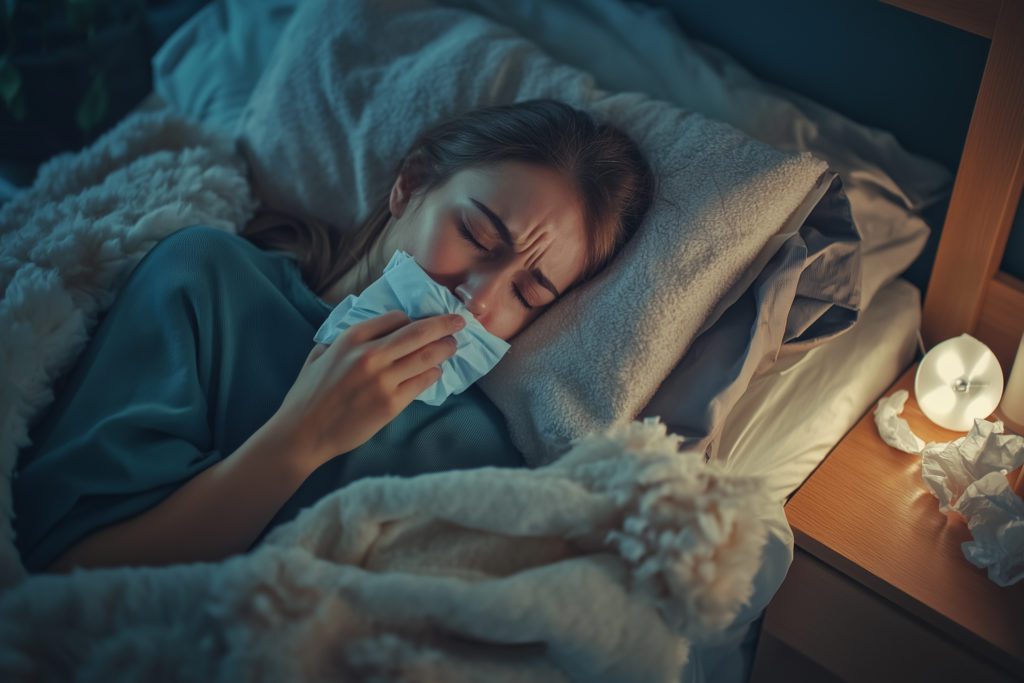
Sleep Deprivation and Immune Function: How Lack of Sleep Weakens Your Defenses
The link between sleep deprivation and the immune system, and how a lack of sleep can weaken your defenses

Ever wonder why you catch every cold that comes your way when you’re sleep-deprived? It’s not just bad luck; your immune system might be waving the white flag. Sleep is like the superhero of our health, swooping in to save the day—or, in this case, the night. But what happens when our sleep superhero decides to take a vacation? Your defenses are down, and your body is left vulnerable. In this article, we’ll discuss the link between sleep deprivation and the immune system and explore how a lack of sleep can leave you feeling less than invincible.
The Basics of Sleep Deprivation: Do You Really Have It?
So, what exactly is sleep deprivation?
It’s not just missing out on your beauty sleep every now and then. Sleep deprivation occurs when you don’t get enough sleep consistently, which can stem from various causes. Stress, anxiety, late-night Netflix binges, or even that pesky neighbor's dog barking at 3 AM can lead to a lack of shut-eye.
But here’s the kicker: sleep deprivation doesn’t just make you feel groggy and irritable. It can wreak havoc on your overall health. Chronic sleep deprivation is associated with weight problems, memory issues, and even heart problems.
Think of your body like a smartphone that needs recharging. Without enough sleep, your battery life dwindles, and soon, you’re operating at 10%, desperately searching for a charger.
The Importance of a Healthy Immune System
Let’s take a quick tour of your immune system. You can imagine it as an elite army defending your body against invaders like bacteria, viruses, and other nasties. Key players in this army include white blood cells, antibodies, and various proteins, all working in harmony to keep you healthy.
When everything is functioning well, your immune system can spot the bad guys, launch a counterattack, and save the day.
A robust immune system keeps you from getting sick. But like any army, it needs rest and recovery to stay sharp and ready for action. This is where sleep comes in, providing the much-needed downtime for your immune system to recharge and prepare for the next battle.
Without it, your immune system is like a soldier trying to fight with one eye open—ineffective and easily overwhelmed.
What's the Connection Between Sleep Deprivation and the Immune System?
Now, let’s connect the dots between sleep deprivation and the immune system. Sleep is crucial for maintaining a healthy immune response. During sleep, your body produces and releases cytokines, a protein that targets infection and inflammation. These cytokines must ramp up when you have an infection or are stressed. Lack of sleep can decrease the production of these protective proteins, weakening your immune response.
Studies have shown that people who don’t get enough sleep are more likely to get sick after exposure to even a simple pathogen (disease causing agent). Additionally, lack of sleep can also affect how quickly you recover if you do get sick.
Researchers have found that sleep deprivation can decrease T cells, which are crucial for fighting off infections. It also reduces the effectiveness of vaccines, making it harder for your body to develop immunity.
So, if you’re wondering why you’re always the first to catch the office flu, your sleep habits might be to blame. Getting enough sleep isn’t just about feeling rested—it’s about giving your immune system the tools it needs to keep you healthy.
Short-Term Effects of Sleep Deprivation on Immune Function
When you don’t get enough sleep, your body is less capable of fighting off infections. This means you’re more likely to catch that cold going around or develop a nagging cough that just won’t quit. It’s like trying to fight a fire with a garden hose; your immune system simply isn’t equipped to handle the job.
Moreover, sleep deprivation can delay your recovery time. Have you ever noticed that your colds seem to last forever when you’re not sleeping well? That’s because your body needs sleep to repair and regenerate. Without it, the healing process drags on, leaving you feeling miserable for longer than necessary.
So next time you’re tempted to pull an all-nighter, remember that you might be signing up for a longer stint in the sick bay.
Long-Term Effects of Chronic Sleep Deprivation
Long-term sleep loss can lead to more serious health problems and significantly weaken your immune system. Chronic sleep deprivation has been linked to an increased risk of various diseases, including diabetes, cardiovascular diseases, and even certain types of cancer.
Chronic sleep deprivation also leads to long-term suppression of the immune system, making you more susceptible to infections and illnesses over time.
How to Improve Sleep Hygiene for Better Immune Health?
So, how can you improve your sleep and, in turn, boost your immune health? It starts with good sleep hygiene.
Establish a consistent sleep schedule by going to bed and waking up at the same time every day—even on weekends. Create a relaxing bedtime routine to signal to your body that it’s time to wind down. This could include activities like reading, taking a warm bath, or practicing mindfulness.
Your sleep environment also plays a crucial role. Make sure your bedroom is cool, dark, and quiet. Invest in a comfortable mattress and pillows, and keep screens out of the bedroom to avoid the temptation of late-night scrolling.
Diet and exercise are also important. Avoid heavy meals and caffeine close to bedtime, and engage in regular physical activity to help regulate your sleep patterns.
By making these small adjustments, you can improve your sleep quality and give your immune system the support it needs to keep you healthy. Remember, getting enough sleep isn’t just about feeling well-rested; it’s about building a strong defense against illness.

Written by
Dr Aqsa
As a Medical Doctor, Dr Aqsa, uses her knowledge to craft complex medical information that is understandable to the general public. For years, she has tried to improve health literacy and empower readers with valuable health knowledge through her articles, blog posts, and educational materials.
Download Pillow
Get help
Press & News
Legal
Connect
X (Twitter)
Company
Copyright © Neybox Digital Ltd.



